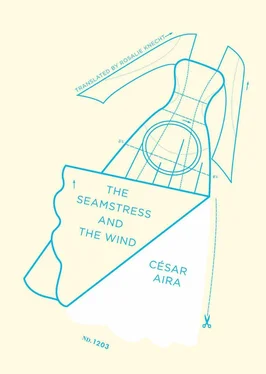Cesar Aira - The Seamstress and the Wind
Здесь есть возможность читать онлайн «Cesar Aira - The Seamstress and the Wind» весь текст электронной книги совершенно бесплатно (целиком полную версию без сокращений). В некоторых случаях можно слушать аудио, скачать через торрент в формате fb2 и присутствует краткое содержание. Город: New Directions, Год выпуска: 2007, Жанр: Современная проза, на английском языке. Описание произведения, (предисловие) а так же отзывы посетителей доступны на портале библиотеки ЛибКат.
- Название:The Seamstress and the Wind
- Автор:
- Жанр:
- Год:2007
- Город:New Directions
- ISBN:нет данных
- Рейтинг книги:5 / 5. Голосов: 1
-
Избранное:Добавить в избранное
- Отзывы:
-
Ваша оценка:
- 100
- 1
- 2
- 3
- 4
- 5
The Seamstress and the Wind: краткое содержание, описание и аннотация
Предлагаем к чтению аннотацию, описание, краткое содержание или предисловие (зависит от того, что написал сам автор книги «The Seamstress and the Wind»). Если вы не нашли необходимую информацию о книге — напишите в комментариях, мы постараемся отыскать её.
The Seamstress and the Wind — читать онлайн бесплатно полную книгу (весь текст) целиком
Ниже представлен текст книги, разбитый по страницам. Система сохранения места последней прочитанной страницы, позволяет с удобством читать онлайн бесплатно книгу «The Seamstress and the Wind», без необходимости каждый раз заново искать на чём Вы остановились. Поставьте закладку, и сможете в любой момент перейти на страницу, на которой закончили чтение.
Интервал:
Закладка:
All at once, I don’t know how, I found myself in the kitchen of my house, behind the table. My mother was standing at the counter with her back to me, looking out the window. She was not working, not making food or tidying things, which was very strange for a classic housewife who was always doing something; but her immobility was full of impatience. I knew because I had a telepathic connection with her. And she with me: she must have felt my presence, because she turned abruptly and saw me. She let out a yell like I’ve never heard from her and brought both hands to her head with a moan of anguish, almost a sob, something she’d never done before but which I knew was within her expressive capabilities. It was as if something impossible had happened, something unimaginable. By the shouting she subjected me to when she was able to articulate again I found out that Omar had come, at noon, to say I’d hidden and wouldn’t reappear despite his calling me and his declarations that he wasn’t playing anymore, that he had to go. Such obstinacy was typical of me, but as the hours passed they started to get alarmed, mamá joined the search, and in the end papá intervened (this was the highest degree of alarm) and was still looking for me, with the help of Omar’s father and I don’t know which other neighbors, in a by-the-book search party through the immediate area, and she hadn’t been able to do anything, she hadn’t started making dinner, she hadn’t even had the heart to turn on the lights. . I saw that, in fact, it was already very dark out — it was almost night. But I had been there the whole time! I didn’t say this to her because I was too emotional to speak. It wasn’t me, they were wrong. . it was Omar who’d disappeared! It was his mother who had to be told, a search for him that had to be undertaken. And now, I thought in a spasm of desperation, it would be much more difficult because night was falling. I felt responsible for the lost time, whose irretrievable quality I understood for the first time.
4
IT’S INCREDIBLE, THE speed a chain of events can take, starting with one that could be called immobile. It’s a kind of vertigo; straightaway events do not occur: they become simultaneous. It’s the ideal resource for getting rid of memory, for making an anachronism of any recollection. Starting from that slip of mine, everything began to happen at once. Especially for Delia Siffoni, Omar’s mother. Her son’s disappearance affected her deeply, it affected her mind, which must have surprised me since she wasn’t the emotional type; she was one of those women, so abundant then in Pringles, on the poor outskirts where we lived, who — before ceasing to bear children forever — had a single child, a boy, and raised him with a certain severe coolness. Each of my friends was an only child, each more or less the same age, each with that kind of mother. They were maniacal about cleanliness, they did not allow dogs, they acted like widows. And always:
a single male child. I don’t know how, later on, there came to be women in Argentina.
Delia Siffoni and my mother had been friends when they were children. Then she’d left town, and when she came back, married and with a six- or seven-year-old boy, she ended up renting, completely by chance, the house next to ours. The two friends were reacquainted. And the two of us, Omar and I, became inseparable, all day together in the street. Our mothers, on the other hand, maintained that distance tinged with malevolence typical of the local women. Mamá found many defects in Delia, but that was practically a hobby for her. In the first place, she thought Delia was crazy, unbalanced: they all were, when you started thinking about it. Then the mania for cleaning; you have to recognize that Delia was exemplary. She kept her little parlor hermetically sealed, and no one ever entered it under any pretext. The single bedroom was resplendent, and so was the kitchen. Those three rooms were the whole house, and their house was an exact copy of ours. Several times a day she swept both patios, the front and the back, including the chicken coop; and the sidewalk, which was dirt, was always sprayed down. She devoted herself to that. We’d nicknamed her “the pigeon,” because of her nose and eyes; my mother was an expert at finding animal resemblances. The way Delia talked also contributed to this: her voice was whispery and abrupt, as were her manners and movements when she was on the sidewalk (she was always outside: another defect): she would move away from her interlocutor with light little steps and then come back again, a thousand times, she’d go, she’d come back, she’d remember something else she had to say. .
Delia had a profession, a trade, which made her an exception among the women of the neighborhood, who were only housewives and mothers, like mine. She was a seamstress (a seamstress, exactly, now I see the coincidence); she could even have made a living with her work, and in fact she did, because her husband had I don’t know what vague shipping job and you couldn’t really say that he worked in the broadest terms. She had a good reputation as a seamstress, trustworthy and very neat, although she had terrible taste. She did everything perfectly, but you had to give her very precise instructions and keep an eye on her up to the very last minute or she would ruin it by following some nefarious inspiration. But fast, she was extremely fast. When the customers came for a fitting. . There were four fittings, that was canonic in Pringlense couture. With Delia, the four fittings were muddled together in an instant, and anyway the garment was already finished. With her there was no time to change your mind, or anything else. She had lost a lot of her clientele because of it. She was always losing customers; it was a miracle she had any left. New ones were always appearing, that was the thing. Her supernatural velocity attracted them, like moths to a candle.
5
IN THE SUMMER, birds woke me. We had only one bedroom for the whole family, in the front of the house, facing the street. My bed was under the window. My parents, country people, were in the habit of sleeping with the window closed; but I had read in the Billiken children’s magazine that it was much healthier to have it open, so when everyone was asleep I would stand on my bed and open it, barely a centimeter, without making the tiniest noise. The uproar of the little birds in the trees out front reached me before anyone else. I was the first one awake, startled by that burst of sharp sounds, just as I had been the last to fall asleep, at the end of an interminable session of mental horrors. And yet it always turned out that my mother had fallen asleep after me, and woken up before. I would find out indirectly, by some remark, and later I knew she stayed up past midnight knitting, sewing, listening to the radio, playing the piano — that last one was a curious pastime, but she had once been the town pianist, she had neither time nor desire to practice in the daytime, and it never woke me up. When the birds did wake me in the morning she had already been bustling around for some time. I don’t know how that could have been, because without denying one reality, I went on believing the other: that I lay awake while she slept, that I even saw her sleeping (I believe I see her still), sleeping profoundly, abandoned to sleep, which made her more beautiful. Her wakefulness was misfiled in sleep. Might she have been a sleepwalker? Her curious habit of playing the piano (Clementi, Mozart, Chopin, Beethoven, and a transcription of Lucia di Lammermoor ) in the depths of the night suggested it. I never heard it, she must have made sure I was sound asleep, but to this day I can evoke that supernaturally sedative nocturnal music, each note untying every knot in my life. That must be where my tortured passion for music started, music I don’t understand, the strangest, most absurd, most avant-garde — to me none of it seems advanced or incomprehensible enough. As an adult, I discovered that my mother slept deeply, she was privileged, a Queen of Sleep, one of those people who could sleep forever, all their lives, if they set themselves to it. But back then she had the coquetry of insomnia, and when by chance she referred to the night it was to say “ I didn’t sleep a wink.” Like all children, I must have believed her word for word. I am also a King of Sleep; I sleep like a log.
Читать дальшеИнтервал:
Закладка:
Похожие книги на «The Seamstress and the Wind»
Представляем Вашему вниманию похожие книги на «The Seamstress and the Wind» списком для выбора. Мы отобрали схожую по названию и смыслу литературу в надежде предоставить читателям больше вариантов отыскать новые, интересные, ещё непрочитанные произведения.
Обсуждение, отзывы о книге «The Seamstress and the Wind» и просто собственные мнения читателей. Оставьте ваши комментарии, напишите, что Вы думаете о произведении, его смысле или главных героях. Укажите что конкретно понравилось, а что нет, и почему Вы так считаете.












